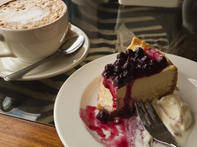Motivated by Reward
Regardless of what drives us to eat, and then eat some more, the satisfaction that some foods give us will trigger the reward centre of the brain, making us feel good. Once we know how good something feels, we might seek out that feeling again and again until the behaviour becomes habitual or even addictive, not dissimilar to addictive behaviour associated with drugs, alcohol, cigarettes, gambling, sex, and even consumerism and social media.

‘Reward dependence drives this kind of behaviour,’ explains Dr John Parker, specialist psychiatrist at the Lentegeur Psychiatric Hospital in Mitchells Plain in the Cape and lecturer at the University of Cape Town.
As hunter-gatherers, we needed certain things to survive, but getting them took a great deal of hardship, effort and energy – running down a kudu, fighting off a lion, struggling in the group for social status, vying with other competitors for a sexual partner, crossing a river to get to a particularly fecund fruit tree.
Without a reward on the other side of all that effort and possibly even danger, we would not have bothered to do it. For more than 95% of our existence as Homo sapiens, when we were hunter-gatherers, reward systems motivated us to pursue these things.
If we did not we would have spent a lot more time lounging about on the pre-agrarian couch and, consequently, not eating, procreating or keeping our place in the social group. Not surviving. Back then, before there could be instant pleasure, there had to be a great deal of investment, both in energy and discomfort.
Taking Shortcuts to Feel Good
If you look at the more conventional addictive drugs there’s a wide range of good evidence to show that the more directly they activate the body’s reward system, the more rapidly or easily an addiction develops. Conversely, the more advanced an addiction, the more potent the substance abused and the more direct the method of delivery.
You don’t see alcoholics drinking Windhoek Light; you need to chew coca leaves for ages to get hooked, it takes much less effort if you are snorting coke, and even less time with a crack pipe. The effect in terms of rapid and powerful stimulation of the reward system is that much greater.
Understood this way an addiction is essentially about shortcuts to that lovely feeling of reward. And once your brain learns about the shortcut, why bother with the long, painful journey? So here we sit, in our sedentary, highly mechanised, fossil-fuel-powered city lives, on the receiving end of a system that is designed to pick, pack and process calories to us like some transcontinental vending machine.
Combine that with our genetic and psychological urges to eat those calories, and the niggling impulse to keep tickling the insatiable reward system in our brains, and it is hardly surprising we are eating as much as we are, getting larger by the decade.
But it must be said that even though our biological hard-wiring as wily hunter-gatherers drives us to seek out food, it should not be an excuse to give ourselves over to those cravings for more spaghetti carbonara or crêpes Suzette.
By Leonie Joubert